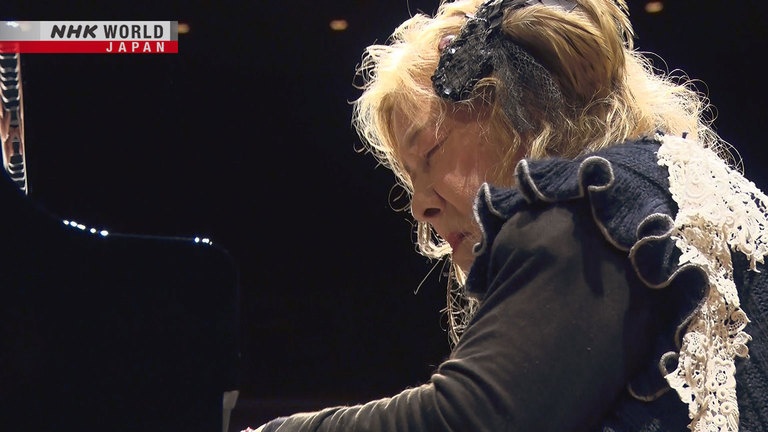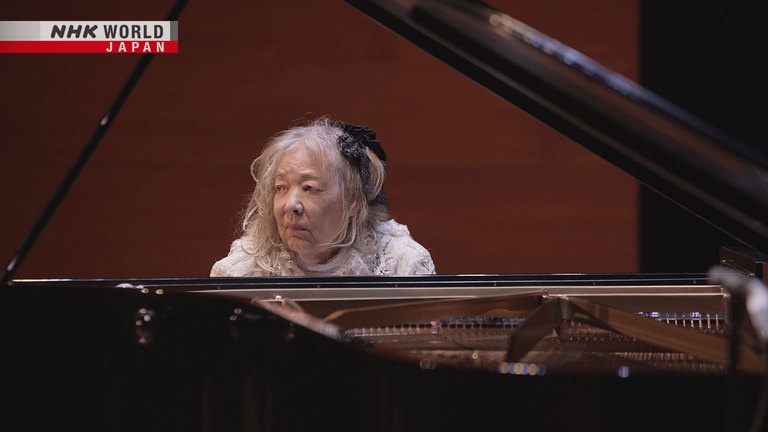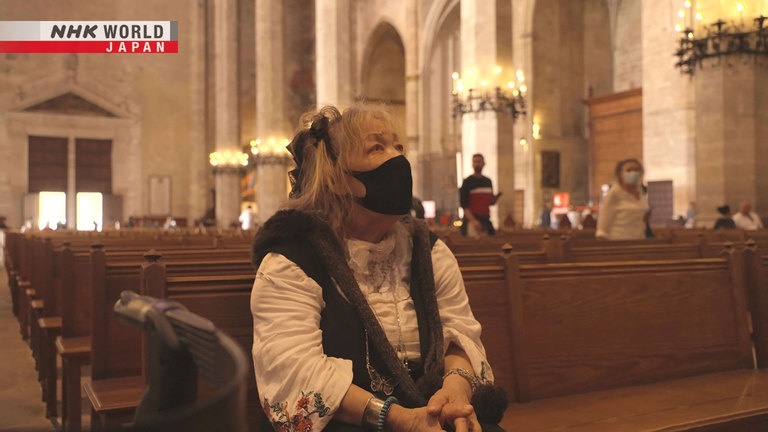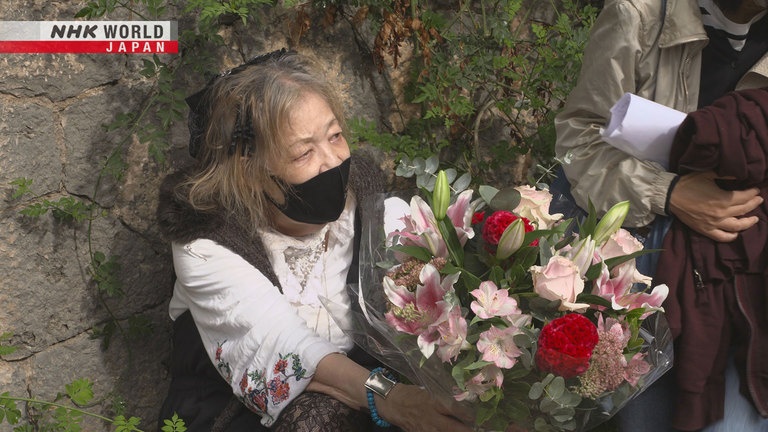Over 90 years old, Fuzjko Hemming still takes to the world's stages as a "pianist of the soul." But her life has not been without obstacles, such as severe hearing loss and a period of statelessness. Her favorite composer, "poet of the piano" Chopin was also beset by obstacles. Taking a winter sojourn to the Spanish island of Mallorca for his health, he wrote several masterpieces despite being told by doctors that he would die there. We follow Fuzjko as she traces Chopin's precious time in Mallorca.




Transcript
When the doors open at a prestigious concert hall...
The fans pour in, eager to hear a gifted pianist who found fame after living an unusual and extraordinary life.
Fuzjko Hemming...
Touted as a child prodigy, she seemed destined for a career as a top-class pianist.
But that changed with a sudden loss of hearing.
For a time, she also could not claim residency anywhere - a woman without a country.
It wasn't until her late 60s that she finally got her break.
Fuzjko is celebrated as a pianist of the soul.
Though in her early 90s, she travels the world performing on numerous stages.
I was so moved.
I thought I might cry.
How does she do it?
The gentleness of the sound?
Or the way the sounds envelops you?
She plays with such sensitivity,
so different from other pianists.
It resonates as if her soul is
producing the sound.
Fuzjko shares her views on her approach.
Achieving perfection is impossible
for human beings.
No one is perfect, no person, no artist.
When I get to heaven,
and meet Mozart and Chopin,
I will ask them if they liked what I did.
I think they'll say I did great.
Who is the first composer
you would like to meet if you could?
I have to say Chopin.
Of course, Chopin.
The one composer that Fuzjko is obsessed with is Fredric Chopin.
Known as the poet of the piano, he expressed his suffering through music.
He was born in a small village 60 kilometers west of Warsaw, the capital of Poland, in 1810.
Excelling in music from an early age, he studied at the Warsaw Conservatory.
In 1830, when he was 20, he bid his homeland farewell to expand his horizons.
At that time Poland was ruled by Russia.
And though the people of Warsaw revolted, their revolution failed.
Chopin spent his entire life wandering through Europe, never once returning home.
There is something about the way Chopin chose to live that fascinates Fuzjko.
In 1838 when Chopin was 28,
he and his lover novelist George Sand, along with her two children, ran away together.
They spent three months in Mallorca, Spain.
Chopin composed several masterpieces there,
even though he suffered from consumption and doctors predicted he would die.
September 2022.
After careful consideration, Fuzjko decides to journey to Mallorca.
The ruins of the monastery in Mallorca where Chopin and Sand lived while on the island...
Feeling a connection, Fuzjko is moved to perform here.
I play now Chopin.
Fuzjiko Hemming's journey to Mallorca, Spain, in search of Chopin.
The journey to Mallorca begins at Fuzjko's Paris home.
Renowned violinist and world-famous concertmaster, Vasko Vassilev is a close friend.
When he learned of her desire to perform in Mallorca, Vasko arranged it with colleagues in Spain.
How are you? Nice to see you!
Ready? We go!
Vasko, who like Fuzjiko was a child prodigy, is the Royal Opera House's first Concertmaster and its youngest.
For nearly 20 years, he has performed with Fuzjiko numerous times all over the world...
And is one of Fuzjiko's trusted friends.
Vasko has offered to drive Fuzjiko over 1000 kilometers from Paris to Barcelona in Spain.
Flying to Mallorca takes just over two hours.
But, the air pressure affects Fuzjko's ears, making her feel unwell.
And so, the road trip plan, involving three days of travel, was hatched.
Fuzjko san, today all France we pass.
She enjoying the trip?
Is she enjoying the trip?
No? But she wanted so bad to go by car.
Which do you prefer, train or car?
I'd rather take a car.
There's so to see.
Car.
Car is easy because she can look around and stop by.
Barcelona in Spain...
Fuzjiko finally arrives after leaving Paris 40 hours earlier.
Are you tired?
We're in Barcelona.
We're in Barcelona now.
This is where Chopin and George Sand stayed, in this hotel.
- Here?
- Yes, this hotel.
Chopin and Sand rested at this very hotel in November of 1838 on their way to Mallorca.
I expect that this will be a very, very exciting pilgrimage,
for somebody that has been playing Chopin's music and trying to find how he composed this and where was he?
Where was his feelings?
Vasco is headed to London for opera rehearsals and a concert in Madrid before going to Mallorca.
He will rejoin Fuzjiko in five days.
Take care, okay.
Fujiko heads to Mallorca, departing on the nearly midnight ferry.
Seven hours later, just past 6:00 am, the lights of Palma, Mallorca come into view.
184 years ago on November 8, 1838, Chopin and Sand arrived at this port on a cargo ship from Barcelona.
Look at all those boats.
So, what brought Chopin and his lover George Sand to Mallorca?
The two met in 1836 at a salon hosted by Chopin's friend Franz Liszt.
Sand was an early advocate for the liberation of women.
At times she would dress in men's clothing, which attracted attention.
Officially separated from her husband, she was known for her many romantic liaisons with prominent men.
At first Chopin showed little interested in Sand, but over time, they grew close.
By 1838, rumors about their romance swirled through the social circles of Paris.
Chopin had been sickly since childhood due to a lung condition that often saw him coughing up blood.
To escape the scandalous rumors and expose Chopin to some Mediterranean sunshine,
Sand planned a madcap adventure to Majorca in the winter of 1838 to 39 with Chopin and her two children.
I feel so sorry for him,
always coughing up blood.
Today, he could be healed,
but in those days, there was no cure.
It must have been so painful. I have also
experienced difficult times, so I do understand.
Fuzjko will be performing two concerts in Mallorca.
Her first will be held at the Superior Conservatory of Music of the Balearic Islands.
Three days since leaving her home in Paris...
Fuzjko is impatient to touch the keys of the piano.
After a concert in Germany, she returned briefly to Paris,
before leaving for Mallorca.
She's exhausted, affecting her left ear,
which normally only has 30% hearing.
It's difficult as my hearing is poor.
I can't make out the softer sounds at all.
What day is it?
- 29th. No, it's the 27th.
Today's the 27th.
No, what time is it?
From what time?
- No, what time is it now?
It's 1:49 pm.
It's 1:49 now.
What time did I start?
12:30.
I'm tired.
I haven't played La Campanella yet.
The program includes works
by Chopin, Liszt and Schubert.
Fuzjko always pushes herself
to deliver an excellent performance.
Fuzjko practiced for an hour and a half.
I'd like to stop here for today.
I'm tired.
And there is tomorrow...
Is this the concert hall?
This is nice!
In 1927, Fuzjko's mother, Toako was in Berlin studying piano.
She met and married Swedish designer, Gösta Georgii-Hemming in 1931.
They were soon blessed with their first child, Fuzjko.
And in 1932, the family moved to Japan.
Recognizing that Fuzjko had all the hallmarks of a child prodigy,
her mother chose to strictly supervise her musical training.
In 1938, Gösta turned his back on Japan, feeling ostracized as a foreigner amongst other things.
He returned to Sweden, leaving his family behind.
Fuzjko's mother supported the family by teaching the piano.
Fuzjko most loved listening to her mother play Chopin.
My mother would put us to bed.
And then, after eight, she would play the piano.
It was our lullaby and
I still remember how lovely it was.
She always played Chopin.
I think it was his Nocturne.
And while playing,
I think she thought about her children.
When Fujiko turned 16, she developed an ear infection and lost hearing in her right ear.
This proved to be beyond emotionally painful.
Despite this, Fuzjko continued with the piano, relying on her left ear.
She attended Tokyo University of the Arts,
and at the age of 21, won an award at a prestigious Japanese music competition.
Fuzjko's dream was to study where her mother had... in Germany.
But when Fuzjko applied to study in what had become West Germany, she ran into an unexpected obstacle.
Legally, she was neither Japanese, nor a citizen of Sweden, her father's native land.
In the post-war chaos, she had not chosen a nationality
and discovered that she was, in fact, a woman without a country.
I was in a very difficult situation
as I was not allowed to leave Japan.
Luckily the West German ambassador was
a huge fan of mine...
so he took care of everything.
Because of him, I was able to
acquire a Red Cross refugee passport...
and finally make my way to West Germany.
At the age of 29, Fuzjko moved to West Berlin in 1961.
Pursuing new opportunities, Fuzjko moved to Vienna.
And in 1969, eight years after leaving Japan, she finally got lucky.
She had caught the attention of the legendary conductor, Leonard Bernstein...
He arranged for her to give a piano recital in Vienna.
Posters were up all over the city.
And then, once again, tragedy struck.
Just before the performance, Fuzjko came down with a ferocious fever.
Her left ear, which still had hearing, suffered damage...
The concert had to be canceled.
After that, no more big chances came Fuzjko's way.
And she had to resort to earning a living as a piano teacher.
In 1995, the death of her mother brought Fuzjko back to Tokyo.
She had been living in Europe for 34 years.
Four years later, a documentary featuring Fuzjko and the challenges she endured was aired on TV... to an overwhelming response.
Tickets for her next concert sold out in a flash.
And in her late 60s, Fuzjko found herself to be a rising star.
Fuzjko is hoping that the Mallorca journey will lead to a deeper understanding of Chopin's life.
In 1830, at the age of 20, Chopin left his native Poland in pursuit of success.
After that, he was never able to return.
1830 saw the beginning of a civil uprising in Warsaw.
At the time Poland was ruled by Russia.
Young Polish men decided to fight for independence, launching a revolutionary movement.
But, the Imperial Russian Army eventually crushed the uprising in 1831.
Poles living abroad, including Chopin, could not face returning to their homeland...
virtually becoming political exiles.
I didn't know that Chopin couldn't return.
I hadn't thought about that before.
Fuzjko also experienced being stateless.
From her twenties to her sixties, she lived alone in Europe.
Where is my homeland?
I don't know where my homeland is.
It's not Japan, it's not Sweden
and it's not Germany.
I like them all.
I would never attack them.
That would be ridiculous.
Fuzjko gives a concert in Ukraine every year.
The hall in Chernihiv where Fujiko performed in 2019
apparently has suffered damage in the Russian invasion.
She is also concerned about the concert hall in Lviv,
as no one has been able to reach its staff members.
Fuzjko is helping the Ukrainian people however she can.
I spent all the money from the concert for Ukraine.
I helped two young persons, a woman and a man,
from Ukraine in my apartment in Berlin.
Bravo! So they stay in your apartment?
Maybe they... I don't know... went back. I don't know.
The day of Fuzjko's first Mallorca concert...
Tickets are sold out.
Classical music fans gather to hear an artist whose life has had its twists and turns,
but is still active in her 90s.
I pray to Chopin. "Please don't let me
make mistakes, or play in an off way."
In elementary school, Fuzjko learns to play Chopin.
Until then she had an aversion to the instrument
due to her mother's strict teaching.
Now she was loving it.
In her teens she was given special instruction by Leonid Kreutzer,
a highly influential pianist from Berlin.
She remembers he admired her performance passionately.
From a young person's perspective,
I appreciate her experience and knowledge.
She was incredible.
It was the best!
What a wonderful performance.
Especially at that age, the agile movements
of those fingers were really wonderful!
How did it go today?
I made many mistakes.
But that can't be helped.
Plus it's hot.
The audience response was great!
- That's what counts most.
The audience is number one!
Chopin and George Sand with her children...
When they arrived in Palma, the city was full of people fleeing from the mainland due to the Spanish civil war.
And they struggled to find lodging.
Through an introduction by the French consul, they managed to rent a home in the suburbs,
eight kilometers from the city center.
It is called, "House of the Wind."
Fuzjko is on her way there, as part of her journey to "connect with Chopin."
Gaspar Valero is a historian.
Estefania Pomar is an artist and the home's owner.
Son Vent.
"Son" means "someone's" and is
conventionally followed by a person's name.
But here, with a bit of humor,
the word 'wind' was incorporated.
Since it is located on a hill,
Son Bento refers to "the wind's property."
In 2013, Mr. and Mrs. Pomar bought the abandoned property and spent four years restoring it.
Chopin had hoped to restore his health in the lush countryside of this warm land.
But, with the onset of winter, his health deteriorated.
For a few weeks, things had gone well.
Then the Mallorcan winter hit.
And the weakened Chopin could not
find a way to recover his health.
Chopin consulted with doctors, who suspected he had tuberculosis and was going to die.
The piano that was supposed to be brought to Mallorca for his composing work did not arrive.
And then another turn of fate...
The landlord of the House of the Wind, after hearing of Chopin's illness,
wrote a letter demanding that Sand and Chopin leave.
The landlord became alarmed when he heard
about Chopin's tuberculosis diagnosis.
At the time, the doctors were obliged to
notify the Mallorcan administration.
In 1820 there had been an epidemic of plague
in two villages,
and in 1821 there was a yellow fever epidemic.
Many people living in Palma died
during that time.
The medical policy mandated
the burning of furniture...
and the avoidance of contact with
anyone diagnosed with a disease...
as part of preventive and sanitary measures.
On December 10, 1838, Chopin and Sand were forced out of the "House of the Wind."
A letter dated December 3, 1838 was written by Chopin from the House of the Wind to Fontana,
a Polish friend living in Paris.
I have not been able to send you the manuscripts.
Despite a heat of 18 degrees Celsius, I caught a bad cold.
The three most celebrated doctors of the island met for a consultation.
The first said that I would die.
The second that I was dying.
The third that I was already dead.
And yet I live as I used to live in the past.
After a few days I shall be living in the loveliest spot on earth: sea, mountains... all one could wish.
We are going to live in an old, ruined, abandoned Carthusian monastery.
Tell nobody that I have been ill; it could only encourage gossip.
The village of Valldemossa, 18 kilometers from Parma.
This is the monastery where Chopin and George Sand took refuge.
At that time in Spain, monasteries with fewer than 12 occupants were disbanded,
and the rooms were rented out to the public.
When Chopin and Sand arrived reportedly only two or three people were living in this vast monastery.
This is the place in Mallorca that Fuzjko has most longed to visit.
She believes that this monastery is where she will be able to feel Chopin the most.
Vasko arrives in Mallorca to join Fuzjko.
How is Chopin's place? Do you like?
- Nice!
- Very nice, ne!
Fuzjko is gearing up for her second concert the following day at the monastery.
Vasko, who arranged this, is taking her to inspect the space, along with pianist Miquel Estelrich.
This is a sacred pilgrimage place
for pianists.
This monastery has been hosting the Chopin Festival since 1931.
The place that has hosted numerous world-famous pianists will be the venue for Fuzjko's concert.
I feel that the atmosphere of
this Carthusian monastery...
deeply influenced Chopin's work.
Though the piano had been held up at the port,
George Sand somehow managed to get it delivered to a very anxious Chopin.
The monastery was a place isolated from the world with no unbidden guests.
The solitude allowed Chopin to listen to what was in his heart,
enabling him to complete several significant pieces there.
Ballad No. 2. Chopin's reflections on Poland.
A beautiful serene melody suddenly
turns violent and stormy.
Chopin was aware of the "ballads" by Polish poets.
Polish literature's ballads depict the world view of
oppressed people based on folklore.
While composing at the monastery, Chopin completed this piece,
replacing the words of the Polish poets with the poetry of music.
George Sand later wrote about her life in Mallorca with Chopin.
On one occasion, she had taken the children shopping in Palma, leaving the ailing Chopin alone.
On the way back, there was a torrential downpour, creating a flood.
The driver of the carriage abandoned them.
When Sand returned to the monastery late that night,
what caught her eye was the figure of Chopin playing a beautiful prelude with tears streaming down his face.
When he saw us come in, he shot up and with a loud scream said, "Oh, I was certain you were dead!"
But then he confessed that while waiting for us he had seen all this in a dream,
and that, not distinguishing this dream from reality, he calmed down.
And as if dozing while playing the piano, he became convinced that he himself had died.
On February 11, 1839, three months after Chopin and Sand arrived in Mallorca, they returned to France.
Locals had not been entirely welcoming... and there was Chopin's unfortunate medical condition.
Sand continued to support Chopin before their separation eight years later.
The poet-pianist passed away in 1849.
He was 39.
It's as if this trip has allowed me to
experience the sadness that Chopin experienced.
He was not exactly a happy person,
and I can feel the depth of his pain and sorrow.
I'm not so gifted with words
and can't articulate my feelings well.
Three hours before the concert...
During times of illness and loneliness, Chopin was always at his piano.
Fuzjko is facing her waning years.
She seats herself at the piano, practicing with all she has, so she can deliver her best.
The monastery where Chopin spent time and composed masterpieces...
I play now Chopin.
The song Fuzjko's mother played
for her when she was small.
Even though Fuzjko is not visible,
the audience listens with rapt attention.
Fujiko plays Etude "Revolutionary," which Chopin composed in 1831,
at the same time of Russia's invasion of Warsaw.
I did my best, praying to God,
"Please don't let me make a mistake."
I made fewer mistakes than at the last one.
How was it playing in Chopin's place?
It was amazing!
I don't have the words to express it.
It was unbelievable!